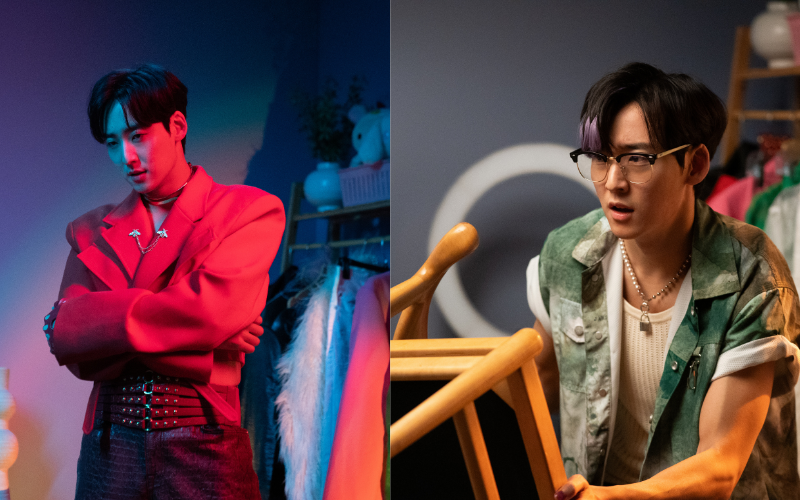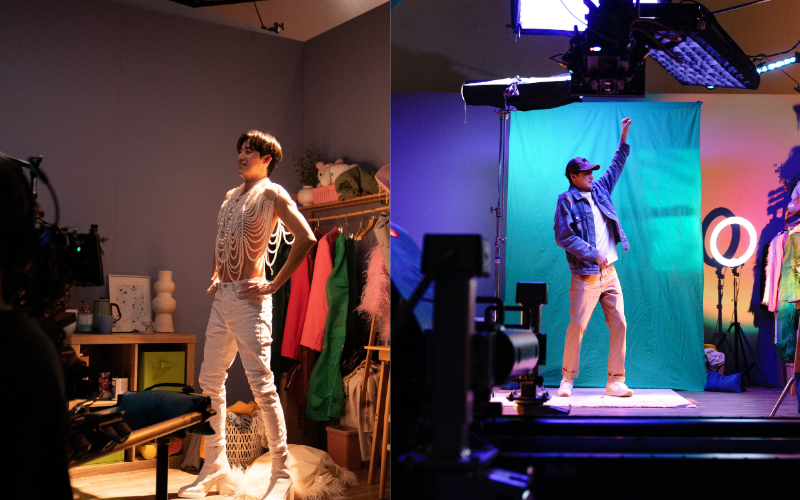Former member of U-KISS, Kevin Woo, stars as the lead in the new short film "Seoul Switch," which is poised for expansion into a feature-length film, directed and written by Liann Kaye. In the short film, Kevin Woo plays dual roles; an insecure American teenager from Ohio and an international K-pop idol, who both choose to swap identities due to their striking resemblance.
"Seoul Switch" is a whimsical and entertaining short film that delves into Asian American identity. It's a contemporary take on "The Prince and the Pauper," set in modern-day Korea, but approached with a clever, comedic, and satirical perspective. While the switch trope traditionally lacks depth and nuanced characters, this film elevates the concept by addressing subjects of class, race, and privilege within its playful storyline.
"Seoul Switch" received the Best Narrative Short award at the DisOrient Film Festival and was named Best Short Film at the Incheon International Short Film Fest. Additionally, Kevin received the Best Actor award, and Liann won Best Editing at the Hollywood Shortsfest. The film has also been showcased at Bentonville, Short Shorts Asia, and the New York Asian Film Festival at Lincoln Center.
Liann Kaye is a Chinese American filmmaker based in NYC and has directed videos for Global Citizen’s International Music Festivals, working with artists like Beyoncé, Jay-Z, Coldplay, and Metallica. She has also directed MVs for Carlos Valdes (The Flash) and Darren Criss (Glee) and many more.
Her award-winning short film "The Blessing" premiered at numerous festivals last year, winning Best Comedy at the New York Short Film Festival and receiving the NYC Women’s Fund.
Furthermore, her debut feature ‘’Electable,’’ was chosen for both the Athena Lab and The Blacklist x WIF Feature Film Residency.
Below are excerpts from an email interview with Liann Kaye on July 22.

1. Share with us your journey to becoming a writer and director
I started editing videos in high school on iMovie 2007. I was a nerdy kid who loved student government so I created a lot of commercials for school events such as homecoming, prom, etc. I loved seeing my work play on the morning announcements. Later, when my sister disappointed my immigrant parents by becoming a rock musician, I decided to get a stable job in corporate video while still directing her music videos on the side. It was only in 2019 that I decided to embrace my true identity as an artist and pursue narrative film.
Since then, I have written and directed a six-episode mini-series, ‘’The Blessing’’, about my interracial marriage which is out now on YouTube. I have a couple of feature films in the works and ‘’Seoul Switch’’ is my latest project.
2. What was the motivation behind creating the film "Seoul Switch"?
Like many Asian Americans, I grew up only seeing Western faces in the media. This gave me the impression that Asians couldn't be in entertainment. When K-pop became a global phenomenon, I was astounded to see Korean pop idols performing with such confidence, swagger, and sex appeal. The idea of these confident Korean guys having to make it through American high school was simply hilarious to me. I also loved the movie ‘’The Parent Trap,’’ growing up, so the idea of one ethnically Korean guy playing both an insecure American and an overconfident K-pop idol seemed like not only a fun concept but also a way that I could explore race, privilege, beauty standards, and masculinity.
3. What led you to choose Kevin Woo as the protagonist?
Believe it or not, there are actually only a handful of Korean-American K-pop idols today. I never dreamed I’d have the privilege of getting in touch with one because most of them are in active groups.
Originally, I thought I might have to find a really great Korean-American actor who was perfectly bilingual, a dancer, singer, rapper, and model who had the face of a K-pop idol (this film is about Eastern vs Western beauty standards so that part had to be accurate).
Then I went to see "KPOP" the musical on Broadway. Kevin immediately stood out to me as he effortlessly switched between Korean and English and showcased an incredible range of talents. He might be one of the most gifted individuals I know. If anything, I was shocked he was available and interested in working with me.

4. Can you discuss the significance of color palettes chosen for different scenes?
The film has three phases. Act I, when our protagonists first meet, is shot in the style of a K-drama. Act II, the makeover montage emulates the K-pop music videos we know and love; lots of bold colors, outfits, and lighting. Finally, in Act III, when the final decision needed to be made, we drew inspiration from one of my favorite filmmakers, Won Kar Wai. Dark moody lighting with pops of color.
5. What challenges did you face while filming "Seoul Switch"?
Kevin had to play two roles as one person. I dedicated a significant amount of time to studying the behind-the-scenes featurette of ‘’The Parent Trap’’ to learn how they achieved this with Lindsey Lohan. The newest technology that our crew had to learn was using this automated robotic arm that could match the speed and movement of the camera each time so we could composite both Kevins into the same take.
6. What message or emotion did you hope to convey to the audience through "Seoul Switch"?
When I first discovered K-pop, I was amazed to see confident Koreans influencing crowds in a way I had never seen from Asian individuals before. I wondered, “Could I be famous over there?” Unfortunately, I've discovered that a hierarchy of Asian beauty still exists within the Korean pop industry. As a Chinese American woman, this is just another example of the marginalization I’ve faced throughout my life. However, there is a silver lining; my experience as an underrepresented filmmaker in both America and Korea resonates with the theme of feeling like an outsider no matter where you are.
My film ‘’Seoul Switch’’ examines the minority experience through a cross-cultural lens. It also looks at K-pop through the female gaze, which is not about objectifying men, but making the audience feel what women experience in response to K-pop.

7. What did you find most rewarding while filming "Seoul Switch"?
The process of integrating Kevin into my project has been extraordinary. As a writer, he has lent priceless specificity to my script’s portrayal of the K-pop industry. He has also shared his experiences of being ignored as an American teenager, then revered as the “most conventionally attractive” in his Korean boy group. Many teenagers who enter the K-pop industry leave with trauma. It has been a journey, earning Kevin’s trust and reading his comfort level in sharing his story.
As a director, shaping the characters of DJ (the American) and Moon (the Korean) was the most creative experience of my life. Kevin and I drew from multiple actors; some native Korean, some Korean-American, all with different takes. The rehearsals were a playground of ideas, laughter, and even tears as Kevin found his way into embodying both roles. Even though I wrote the script, directing meant listening to my actors. Lucky for me, Kevin’s life experiences were so specific to the plot that I was delighted to find that my trust in him was bottomless.
8. How did you ensure that the film accurately represented both American and Korean cultural perspectives?
I am a K-pop fan first and foremost and have watched hours and hours of footage of NCT127 rehearsing, recording, and goofing around, behind-the-scenes on their music videos, it’s absolutely parasocial, so I got the first draft of the feature done from extensive research. Then, I was able to incorporate Kevin's real-life experiences as someone who has spent half his life in America and the other half in Korea. He truly embodies the duality that many Asian-Americans experience and I hope this fun premise deeply resonates with anyone who feels they belong to two worlds.
9. What goals or hopes do you have for "Seoul Switch"?
"Seoul Switch" is currently making its rounds on the festival circuit, and we've garnered a dedicated social media following. We've even had executives from both America and Korea reach out to us online. However, many don't grasp the nuance required to tell this story. Some executives have suggested casting members of BTS as the leads, despite none of them being American or speaking English with an American accent.
Authentically telling this story demands the right collaborators. This has made me even more determined to reject unsuitable offers in service of both my story and Kevin’s story. I truly feel this is destined.
How about this article?
- Like4
- Support2
- Amazing3
- Sad0
- Curious0
- Insightful0


